Related Research Articles

Thomas Heyward Jr. was an American Founding Father, lawyer, jurist, and politician. Heyward was active politically during the Revolutionary Era. As a member of the Continental Congress representing South Carolina, he signed the Declaration of Independence and Articles of Confederation. Heyward's imprisonment in Florida by the British for nearly a year and the loss of a considerable number of slaves led to his being proclaimed a martyr of the revolution.

Charles Cotesworth Pinckney was a Founding Father of the United States, military officer during the Revolutionary War, attorney, planter, and slave owner. A delegate to the Constitutional Convention, Pinckney was a signer of the U.S. Constitution and later served as U.S. Minister to France. He was twice nominated as the presidential candidate of the Federalist Party, in 1804 and 1808, but lost both elections, the first to Thomas Jefferson and the second to James Madison.

Hugh Williamson was an American Founding Father, physician, and politician. He is best known as a signatory to the U.S. Constitution, and for representing North Carolina at the Constitutional Convention.

Hugh Swinton Legaré was an American lawyer and politician.
William Churchill Houston, a Founding Father of the United States, was a teacher, lawyer and statesman. Houston served as a delegate representing New Jersey in both the Continental Congress and Constitutional Convention. He was elected to the American Philosophical Society in 1780.
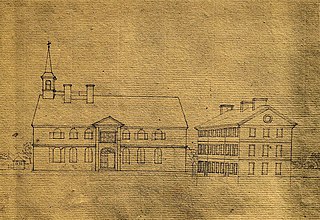
The Academy and College of Philadelphia (1749-1791) was a boys' school and men's college in Philadelphia, Colony of Pennsylvania.

John Edwards Holbrook was an American zoologist, herpetologist, physician, and naturalist, born in Beaufort, South Carolina, the son of Silas Holbrook, a teacher, and Mary Edwards. Although Holbrook's memoir, written by his medical partner, and his tombstone both give the date 1794 for his birth, this is incorrect. Holbrook received his A.B. degree from Brown University in 1815, and his M.D. from the University of Pennsylvania in 1818. In 1827, he married Harriott Pinckney Rutledge (1802–1863), granddaughter of John Rutledge and a member of the Middleton-Rutledge-Pinckney family.
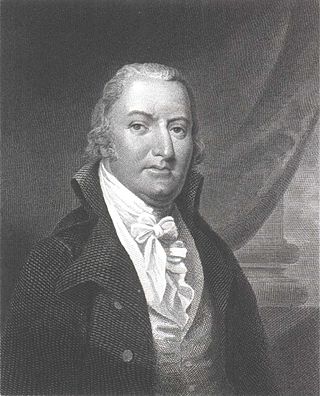
David Ramsay was an American physician, public official, and historian from Charleston, South Carolina. He was one of the first major historians of the American Revolutionary War. During the Revolution he served in the South Carolina legislature until he was captured by the British. After his release he served as a delegate to the Continental Congress in 1782–1783 and again in 1785–1786. Afterwards he served in the state House and Senate until retiring from public service. In 1803, Ramsay was elected a member of the American Philosophical Society in Philadelphia. He was murdered in 1815 by a mentally ill man whom Ramsay had examined as a physician. He is the first American politician to be assassinated.

Archibald Henry Grimké was an African American lawyer, intellectual, journalist, diplomat and community leader in the 19th and early 20th centuries. He graduated from freedmen's schools, Lincoln University in Pennsylvania, and Harvard Law School and served as American Consul to the Dominican Republic from 1894 to 1898. He was an activist for rights for blacks, working in Boston and Washington, D.C. He was a national vice-president of the National Association for the Advancement of Colored People (NAACP), as well as president of its Washington, D.C. branch.
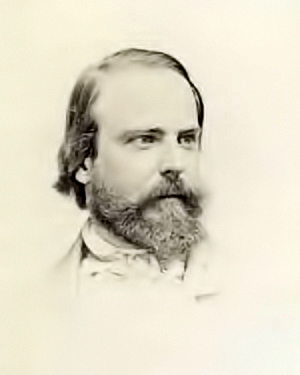
John Lawrence Smith was an American chemist and mineralogist.
Alexander Gordon Bearn informally Alick Bearn, a physician, scientist and author, was professor at Rockefeller University and Cornell University Medical College. He was a member of the National Academy of Sciences, and had been Executive Officer of the American Philosophical Society. He died Friday, May 15, 2009, in Philadelphia. Prior to his death Bearn was working on a family history that followed the Bearn family from Béarn, France to Angus, Scotland and finally to the United States.
George Turner was an English-born soldier, land speculator, and jurist from South Carolina.
Rev. Samuel Magaw, D.D. was a clergyman and educator from Pennsylvania. He was a member of the American Philosophical Society in 1784 and served as Vice Provost of the University of Pennsylvania (1782–1791).

Henry William de Saussure was an American lawyer, state legislator and jurist from South Carolina who became a political leader as a member of the Federalist Party following the Revolutionary War. He was appointed by President George Washington as the 2nd Director of the United States Mint, was a co-sponsor of the legislation that established the South Carolina College which was to become the University of South Carolina and was given the title of Chancellor as a justice of the SC Equity Court, also known as chancery court. In this capacity he wrote and codified much of the state's equity law still in use today. He served as Intendant (Mayor) of Charleston while his son, William Ford de Saussure, likewise, served as Intendant (Mayor) of Columbia, SC.
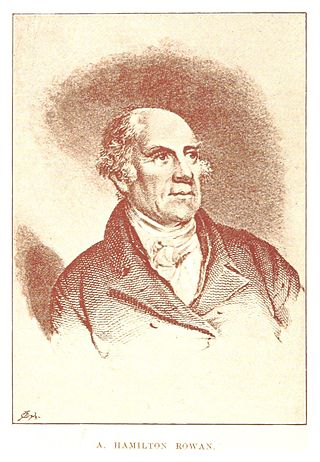
Archibald Hamilton Rowan, christened Archibald Hamilton, was a founding member of the Dublin Society of United Irishmen, a political exile in France and the United States and, following his return to Ireland in 1806, a celebrated champion of democratic reform.
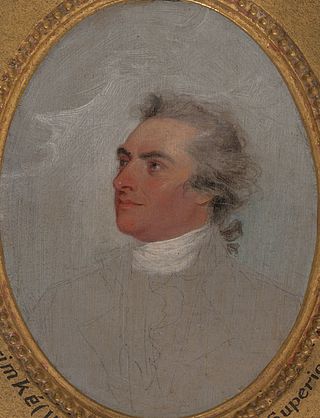
John Faucheraud Grimké was an American jurist who served as Associate justice and Senior Associate Justice of South Carolina's Court of Common Pleas and General Sessions from 1783 until his death. He also served in the South Carolina state legislature from 1782 until 1790. He was intendant (mayor) of Charleston, South Carolina, for two terms, from 1786 to 1788.

John William Mallet FRS was an Irish chemist who lived and worked in the United States.

John Rutledge was an American Founding Father, politician, and jurist who served as one of the original associate justices of the Supreme Court and the second chief justice of the United States. Additionally, he served as the first president of South Carolina and later as its first governor after the Declaration of Independence was signed.
Albert Simons, had a sixty-year career as an architect and preservationist in Charleston, South Carolina, where he is known for his preservation work and architectural design. He played a key role in the Charleston Renaissance. Simons helped to create many nationally prominent preservation functions such as the zoning ordinance for the historic district, the first such ordinance in America, with municipal austerity, and the first Board of Architectural Review. As a professor at the College of Charleston for over 20 years, he started the School of the Arts whose building is named after him and is honored yearly through the Simons Medal of Excellence.
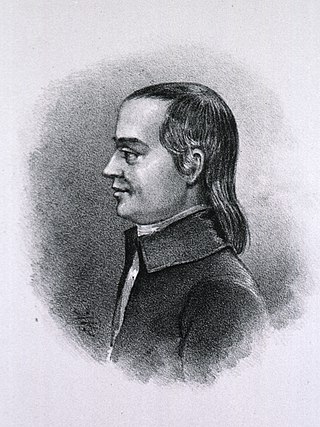
Samuel Powel Griffitts was an American physician, widely regarded as the founder, in 1786, of the Philadelphia Dispensary. He was an early member of the American Philosophical Society, elected in 1785.
References
- ↑ "New Series, Number 20". The Pilot . Vol. 29, no. 21. 2 June 1866. p. 5. Retrieved 19 July 2021– via Boston College Newspapers.Letter to the editor in response to a request for any information about Professor Archibald Gamble
- ↑ "Archibald Gamble". University Archives and Records Center. Retrieved 2 June 2021.
- ↑ Borick, Carl P. (2 August 2012). A Gallant Defense: The Siege of Charleston, 1780. Univ of South Carolina Press. ISBN 978-1-61117-168-6.
- ↑ Proceedings of the American Philosophical Society. American Philosophical Society. 1889.
- ↑ "APS Member History". search.amphilsoc.org. Retrieved 2 June 2021.